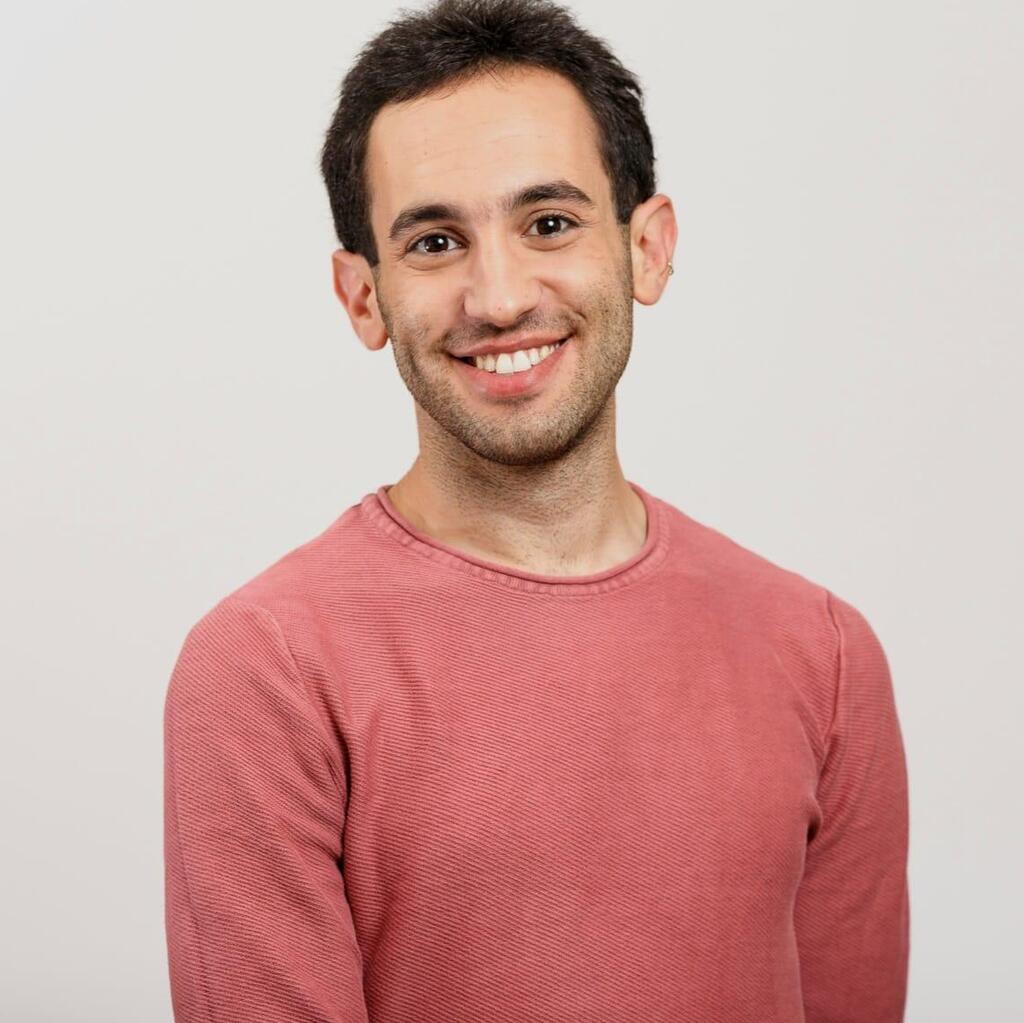“At some point I couldn’t take it anymore. I went up a tall building in Jerusalem, looked down and wanted to jump, but then, I decided I need to live differently, get out of the closet, and that’s when my healing began,” says Ben Zilberman, a social worker who went through a traumatic conversion therapy as a teenager.
“The head of my yeshiva discovered I was gay and since I was only 17, he sent me to seven years of conversion therapy. I went to two therapists. One was a psychologist and the other presented himself as a psychotherapist. They believed homosexuality stems from a pathology in gender identification, and that attraction to the same gender is not something you’re born with, but an unhealthy relationship with the parents and friends of the same gender.”
“There were weekly sessions, in which they told me my attraction to boys comes from a yearning for a father figure and an overly close relationship with my mother.
“The therapist asked me about my childhood experiences. He was empathetic and attentive, but made the point of emphasizing the connection between those experiences and my homosexual attraction. I was a Haredi teen and my world turned upside down, but I looked forward to the sessions, since it was the only place I could safely share about how I truly felt.
“Through listening, they managed to instill within me the belief that my attraction is a result of childhood traumas, and pursuing it would only serve to cause more pain. I had a strong emotional connection to my therapists and I believed them when they said they cared about me.
“Instead of telling me that one man’s love for another is nothing to be ashamed of and that I should listen to my heart and embrace who I am, they used professional tools to tell me that if I connect to my own manhood, my pathological same sex attraction would subside.
“After awhile, seeing no change in my attraction to men, I began doubting the treatment, but fearing I’d be isolated, I buried those doubts. It’s only when I read about conversion therapy as part of a paper at the university that I came to an understanding that much like those in the study, I too was never given the option of choosing a different path. That I was trapped in a sort of a golden cage for seven years.”
Zilberman says that following this realization, he stopped the conversion therapy and sought treatment from a “legitimate” therapist who also happened to be part of the LGBTQ community.
“Suddenly I was with someone who had no agenda. My needs and wants were now the center, as opposed to religious values and conservative beliefs. It was a corrective experience for my soul that emphasized my right to enjoy love, the way my soul was asking for all this time.”
Conversion therapy is a pseudo-scientific technique to eliminate someone’s attraction to the same sex. Many believe it started in 1989 with German psychiatrist Albert von Schrenck-Notzing, who declared that he managed to convert a gay man to being straight with hypnosis and by visiting brothels.
He was not the first Gruesome methods such as blood squirting, abstinence, exorcisms, partial removal of brain parts and others were used prior to that.
The long-held belief that homosexuality is a mental disease helped legitimize these conversion therapies. It was only 1992 that conversion therapy was officially banned as a way of treatment. The UN classifies conversion therapy as unethical and as standing in opposition to scientific research, and can include methods of abuse. It calls on all UN member states to outlaw such therapies.
In France, any attempt to persuade a gay person to undergo conversion therapy means a fine of up to 30,000 euros or up to two years in prison. Around 25 states in the U.S. have outlawed these therapies as well.
Last February, the Health Ministry banned the method in Israel, explaining that the basic assumption that homosexuality is a mental disease is fundamentally flawed, and that anyone performing it is subject to a loss of license to practice.
With the incoming right-wing government, there’s already talk of re-instatig these dangerous methods nationwide.
“If the Health Ministry’s decision is cancelled, we’re likely to see a spike in suicides, self-harm, depression, anxiety and psychiatric treatments,” says Elior Mor Yosef, a social worker who underwent such therapy himself.
“I grew up in an Jewish Orthodox community in Bnei Brak and was attracted to men from a young age. I told my family, who referred me to a rabbi. He was nice, but he constantly made me aware of how bad my attraction is. He told me about his sex life with his wife as an example of a normal Israeli home that I should aspire to.
“He once asked me to look at women and find one attractive enough to masturbate to. I would try for hours, but obviously to no avail. He also told me that my condition is because my father wasn’t manly enough, and other kind of nonsense,” he says.
“I was a very social kid, but from session to session, I felt more despondent. My parents noticed and asked the rabbi what was happening. He sent them a letter explaining that feeling depressed means I’m on the road to recovery.
“I hated myself more and more. At one point I asked myself: ‘What’s the point in trying?’ and thought about suicide.
“I had a municipal social worker who I told about the therapy I was going through, and he made me understand just how harmful it really was. I stopped the therapy and began the road towards rehabilitation.
“He showed me how you can help people without hurting their self esteem. I followed in his footsteps, Today, I’m a licensed social worker myself. I accompany and help teens from the LGBTQ community.”
Mor Yosef helped established the Treatment Paths For The Proud Community, which makes sure there is a social worker for gay teens in every local municipality.
“I went to those therapies initially believing it was my choice and that I went on my own accord, but I didn’t. It was Haredi society that sent me to fix what was wrong with me. When you’re a teen in such a closed off community, you’re susceptible to these suggestions. I had a Haredi friend who went to that therapy as well and eventually took his own life.”
“Conversion therapy can definitely be life threatening,” said Prof. Rafi Heruti, a licensed sexual therapist and head of The Reuth Rehabilitation Hospital. “Suicide attempts are not uncommon. In any kind therapy, if the therapist guarantees success – beware. Especially when it comes to altering sexual orientation.
“Referring to same sex attraction as a perversion is a red flag with any therapist. Their job is to help you accept who you are, not alter it. Many of these so-called therapists don’t have a license. It masquerades as psycho-dynamic and behavioral treatment, but it isn’t really.
“They can even ask them to force themselves to have sex with women, which only amplifies the sense of being lost and the distress they have to cope with.
“In our clinic, we walk hand-in-hand with those who need help, and those on a path toward self acceptance. It’s not only religious people who come to us. Some get married to women, believing that the wedding would make the gay impulses disappear, which of course it does not. They get confused about who they are and resort to dangerous experimentation, and then the woman finds herself living with a confused man who isn’t attracted to her.”
Why did these treatments prove ineffective?
“Our guiding principle is to first address the sense of distress and let the man get to know himself better. It sounds simple, but getting to know our sexual selves is anything but. It means getting acquainted with professional materials and understanding what sexual orientation even is. They learn to understand that same sex attraction is not a defect, but rather another layer in the human sexual experience.”
What do you believe would happen if the law is overturned?
“Even now, despite the Health Ministry’s decision, conversion therapies still take place under other names, so a simple internet search won’t uncover it.”
“He told me you can change and that you can’t be both religious and gay. That the gays in Tel Aviv who dance naked on trucks at the Pride Parade are lonely, suicidal and have sexually-transmitted diseases,” says Shay Branson, founder of the center that fights conversion therapy called Hevruta. “I grew up in a religious environment that stated that the all-mighty does not like homosexuality. I wanted to be on the path of marriage, kids and family. I didn’t know anything else.
“When I was 13 and it became clear I’m attracted to boys and something needed to be done, I went to a conversion clinic that assigned me a clinical psychologist. The theory was that trauma from my childhood, my relationship with my parents, drugs or alcoholism might be the cause of the same-sex attraction. He actually wanted me to watch porn and explain to him how I masturbate.
“After years of self loathing, the therapist blamed me, claiming I didn’t want it enough. I knew he was wrong. There was nothing I wanted more, but after years of failure, I thought about ending it all. I thought relinquishing my sexual identity meant doing the same with my religious one,” he says.
“The primary damage is mental,” says Netanel Scheller, CEO of Hevruta. “Gays internalize homophobia and develop self loathing. They often come to us with financial difficulties, since much of their funds went towards the therapy that didn’t work.
“It’s important to understand these conversion therapies are expensive. They begin at around 450 NIS a session and can accumulate to thousands every month. People arrive at our doorstep with no energy, no money and socially isolated. That’s what we’re trying to fix.”
How is your organization trying to deal with this problem?
“We form conferences, collect evidence, have support groups and file complaints about psychologists who practice conversion therapy. We partner with other bodies on the political, judicial and social levels.
“We’re constantly looking for ourselves and that’s natural. Feeling there’s something amiss is a human emotion that drives us towards healing. We urge on all those on a path of finding themselves to not be persuaded by the absolute truths that these conversion therapy institutions are trying to sell you on. Life is complex, and so are the answers to the biggest questions.”













